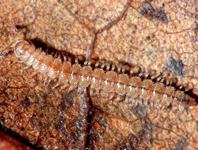Abstract
The family Haemulidae is a wide-ranging group of marine fishes that are of significant commercial value in the Tropical Eastern Pacific (TEP). Phylogenetic studies on the species Anisotremus interruptus have revealed high levels of genetic diversity as well as divergence among populations in the TEP, which suggests that the taxonomic diversity of A. interruptus could be underestimated. Anisotremus interruptus has a large distribution, ranging from central Baja California, Mexico to northern Peru, including all oceanic islands except Clipperton. Recent genetic studies on this taxon indicate the presence of a species complex of at least three distinctive lineages. We performed a comparative study of the population-level meristic and morphometric variation of A. interruptus in the TEP to evaluate and identify possible morphological features concordant with the genetic differentiation of populations. Our results provide evidence of the presence of two new species of the genus Anisotremus, A. perezponcedeleoni sp. n. from the Revillagigedo Archipelago and A. espinozai sp.n. from Galapagos Archipelago-Cocos Island.
References
Bernardi, G. & Lape, J. (2005) Tempo and mode of speciation in the Baja California disjunct fish species Anisotremus davidsonii. Molecular Ecology, 14, 4085–4096.
https://doi.org/10.1111/j.1365-294X.2005.02729.x
Bloch, M.E. (1791) Naturgeschichte der ausländischen Fische. Vol. 5. Schlesinger, Berlin, 152 pp.
Cruz-Romero, M., Espino-Barr, E. & García-Boa, A. (1993) Aspectos poblacionales de cinco especies de la familia Haemulidae (pisces) en la costa de Colima, México. Ciencias Pesqueras, 10, 43–54.
Dias, T.L.P. (2007) What do we know about Anisotremus moricandi (Teleostei: Haemulidae), an endangered reef fish?. Biota Neotropica, 7 (2), 317–320.
https://doi.org/10.1590/S1676-06032007000200037
Domínguez-Domínguez, O., Pérez-Rodríguez, R. & Doadrio, I. (2008) Morphological and genetic comparative analyses of populations of Zoogoneticus quitzeoensis (Cyprinodontiformes: Goodeidae) from central Mexico, with description of a new species. Revista Mexicana de Biodiversidad, 79, 373–383.
https://doi.org/10.22201/ib.20078706e.2008.002.563
Edison-Zamudio, J., Herrera-Collazos, E.E., Maldonado-Ocampo, J.A. & DoNascimiento, C. (2015) Protocolo para la medición de rasgos funcionales en peces dulceacuícolas. In: Negret, S.B. (Ed.), La ecología funcional como aproximación al estudio, manejo y conservación de la biodiversidad: protocolos y aplicaciones. Instituto de Investigación de Recursos Biológicos Alexander von Humboldt, Bogotá, pp. 182–210.
Flores-Ortega, J.R., Avila-Castro, E., Haro-Preciado, H.J. & Godínez-Domínguez, E. (2014) Hábitos alimentarios e interacciones tróficas de Anisotremus interruptus (Pisces: Haemulidae) y Lutjanus argentiventris (Pisces: Lutjanidae) en el Pacífico Central Mexicano. Latin American Journal of Aquatic Research, 42 (1), 276–282.
https://doi.org/10.3856/vol42-issue1-fulltext-24
Gill, T.N. (1862) Catalogue of the fishes of Lower California, in the Smithsonian Institution, collected by Mr. J. Xantus. Part III. Proceedings of the Academy of Natural Sciences of Philadelphia, 14, 249–262.
Hammer, Ø., Harper, D.A.T. & Ryan, P.D. (2001) PAST: Paleontological statistics software package for education and data analysis. Palaeontologia Electronica, 4 (1), 1–9.
Hubbs, C.L. & Lagler, K.F. (1964) Fishes of the Great Lakes Region. University of Michigan Press, Ann Arbor, Michigan, 213 pp.
Lyons, J. & Mercado-Silva, N. (2004) Notropis calabazas (Teleostei; Cyprinidae): New Species from the Río Pánuco Basin of Central México. Copeia, 4, 868–875.
https://doi.org/10.1643/CI-03-240R2
Palmerín-Serrano, P.N., Tavera, J., Espinoza, E., Angulo, A., Martínez-Gómez, J.E., González-Acosta, F. & Domínguez-Domínguez, O. (2020) Evolutionary history of the reef fish Anisotremus interruptus (Perciformes: Haemulidae) throughout the Tropical Eastern Pacific. Journal of Zoological Systematics and Evolutionary Research, 59 (1), 148–162.
https://doi.org/10.1111/jzs.12392
Robertson, D.R. & Allen, G.R. (2015) Peces costeros del Pacifico Oriental Tropical: sistema de información en linea. Versión 2.0 Instituto Smithsonian de Investigaciones Tropicales, Balboa. Available from: https://biogeodb.stri.si.edu/sftep/es/pages (accessed 10 May 2019)
Robertson, D.R., Peña, E.A., Posada, J.M. & Claro, R. (2019) Peces Costeros del Gran Caribe: sistema de Información en línea. Versión 2.0. Instituto Smithsonian de Investigaciones Tropicales, Balboa. Available from: https://biogeodb.stri.si.edu/caribbean/es/pages (accessed 10 May 2019)
Ruiz-Ramírez, S., Lucano-Ramírez, G., González-Sansón, G., Rojo-Vázquez, J.A. & Arellano-Martínez, M. (2012) Biología reproductiva de Anisotremus interruptus (Perciformes: Haemulidae) en el Pacífico central mexicano. Revista Biológica Tropical, 60 (2), 709–720.
https://doi.org/10.15517/rbt.v60i2.3986
StatSoft (2007) Statistica. Version 8.0 (Computer program). Statsoft, Inc., Tulsa, Oklahoma. [software]
Tavera, J.J., Acero-Pizarro, A., De La Cruz-Agüero, J. & Balart, E.F. (2011) Phylogeny and reclassification of the species of two neotropical grunt genera, Anisotremus and Genyatremus (Perciformes: Haemulidae), based on morphological evidence. Journal of Zoological Systematics Evolutionary Research, 49 (4), 315–323.
https://doi.org/10.1111/j.1439-0469.2011.00622.x
Tavera, J.J., Acero, A., Balart, E.F. & Bernardi, G. (2012) Molecular phylogeny of grunts (Teleostei, Haemulidae), with an emphasis on the ecology, evolution, and speciation history of New World species. BMC Evolutionary Biology, 12 (57), 1–16.
https://doi.org/10.1186/1471-2148-12-57
Tavera, J.J. & Wainwright, P.C. (2019) Geography of speciation affects rate of trait divergence in haemulid fishes. Proceedings of the Royal Society B, 286 (1896), 1–10.
https://doi.org/10.1098/rspb.2018.2852


